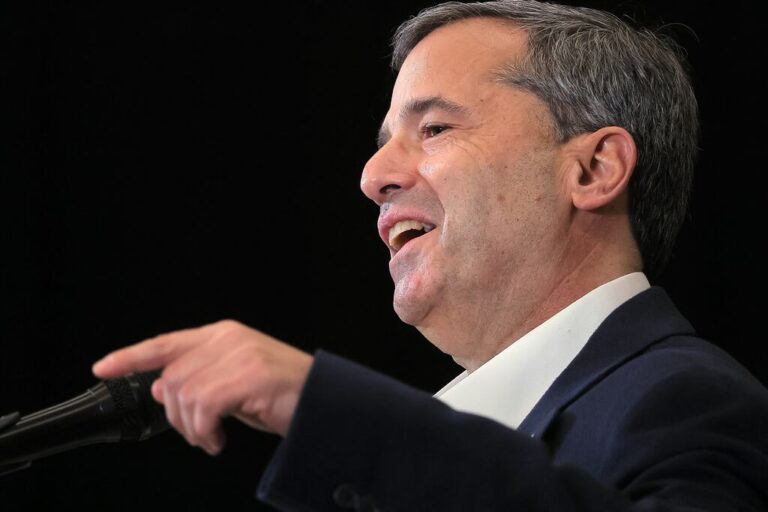On the day he launched his mayoral campaign, Josh Kraft went on the offensive, assailing Mayor Michelle Wu over her record on bike lanes and housing construction. That was no surprise.
But one avenue of attack raised eyebrows across the city. Kraft said he would make good on a progressive policy promise that Wu had tried but failed: Bringing rent control back to Boston.
“Mayor Wu promised us rent control three years ago,” Kraft said. “We will deliver it finally.”
That Kraft, the son of billionaire Patriots owner Robert Kraft and a favored candidate in some corners of the business community, would lean into an issue that many economists believe does more harm than good and most landlords despise, signals just how big a problem the cost of housing has become for everyday Bostonians. Yet the specifics of his proposal suggest he’s trying to walk a fine political line to appeal to two very different political constituencies that rarely see eye to eye: the business community and tenants.
While Kraft calls his proposal rent control, housing experts and political observers said it is not really rent control in the traditional sense of the hard rent caps seen in New York City, San Francisco, and Boston before state voters outlawed them here in 1994. It is instead an optional program for landlords who would receive tax breaks if they agree to cap annual rent increases. While it could be appealing for property owners to participate, it is not mandatory. And critics argue Kraft’s plan may simply provide some landlords with tax breaks, while doing little to protect struggling renters.
But his embrace of a term once considered politically untenable appears to be a calculated move. The idea of rent control has become increasingly popular in some corners of the city as rents climb relentlessly upward. And these days, political observers say, winning an election in Boston requires a whatever-it-takes approach to housing affordability.
“[Kraft’s proposal] is not rent control, but the fact that he’s proposing it shows how significant an issue housing has become for the city,” said Josh Zakim, a former city councilor who served alongside Wu and who now runs a housing advocacy group. “It’s the biggest issue facing the city and the Commonwealth, and I don’t think you can run a serious campaign for public office here without a plan to address it.”
Kraft’s plan takes considerable cues from the version of rent control that Wu tried unsuccessfully to push through the state Legislature in 2023. Like Wu’s plan, it would tie allowable rent hikes to inflation, with a hard cap of 10 percent per year. While Wu’s set no income guidelines, Kraft’s plan would be open to tenants who make less than 200 percent of the Area Median Income, more than $300,000 for a family of four, which he said would prevent luxury buildings from participating.

The biggest differences are that Kraft’s program would be optional for landlords, and would come with a sweetener: property tax breaks of 20 percent for participating buildings. Kraft said he’d pay for that with tax revenue generated by new residential construction, which he hopes to spark by lowering affordable housing requirements.
The city requires 20 percent of units in new developments to be set aside at affordable rents. Kraft wants to lower it to 13 percent, the rule that was in place before Wu took office.
Kraft’s campaign said that because the money would be distributed to landlords in the form of grants, as opposed to formal tax rebates, his plan would not need to go through the state Legislature (though that point is disputed by some advocates and legislators).
“Josh’s opt-in rent control plan would provide real relief to renters, unlike Mayor Wu’s failed plan that has helped no one,” the Kraft campaign said in a statement. “This is yet another unfulfilled promise which Mayor Wu needs to explain to voters instead of calling names and making excuses.”
For her part, Wu assailed Kraft’s plan, calling it “fake rent control.” She said he is using the promise of rent control to win over struggling renters who are hurting, while offering them no real protections.
“This program, a voluntary program, is not going to … protect against the worst offenders [of extreme rent hikes],” Wu said on GBH’s Boston Public Radio last week. “It is a use of resources without offering the types of protections that we really need.”
Wu has not reintroduced her rent control plan since it died in the Legislature last year.
So far, no prominent tenant groups have come out in support of Kraft’s plan, but it’s getting a positive reception among some real estate interests, who lobbied against Wu’s plan and ultimately helped sink it on Beacon Hill.
Developers and landlords generally oppose mandatory rent caps because they limit a building’s profitability, making it more difficult to attract the investors needed to build and therefore slowing new construction. They’re also a political constituency that appears at least intrigued by — if not yet openly supportive of — Kraft’s candidacy.
“We have long been opposed to rent control because we have seen the impact it has on housing production,” said Tamara Small, chief executive of real estate trade group NAIOP Massachusetts, which does not endorse political candidates. “When the investors that finance housing development hear the words rent control, they flee. But this proposal is clearly different. I don’t think it would hurt production the way [Wu’s] proposal would.”
While it’s unclear how many landlords may opt in to such a program, some have already indicated they may be interested. In some cases, the program may actually be profitable for landlords, as they’d get tax breaks even in years when they wouldn’t normally raise the rent above the proposed cap.
Take Chris Lehman, cofounder of real estate investment group Groma. His group typically raises rent by an average of 3 to 5 percent a year across its more than 300-unit portfolio, well below the cap Kraft proposes. He conducted a financial feasibility analysis of Kraft’s plan at the request of his campaign, and found that savings on taxes would make up for lost rent. He said he would consider enrolling the majority of his units.
Lessons in modern-day rent control, 3,000 miles from Boston
“If there were an actual rent control, we would of course oppose it,” he said. ”But this program could mean lower rent increases for our residents without hurting development.”
What remains to be seen is whether Kraft’s rent moderation policy will be enough to win over housing advocates and tenants who have historically come out in force for Wu and who have often demanded stronger affordability requirements in new development. At least one group of advocates, the Coalition for a Truly Affordable Boston, is more focused on his plan to cut affordability, which they called a “direct attack on Boston’s affordability and housing justice efforts.”
“Increasing housing supply alone does not guarantee affordability — especially when developers are not required to build homes that meet the needs of our residents,” said Shameeka Moreno, a member of the Boston Tenant Coalition.
And lawmakers who’ve long worked on housing issues say they’re skeptical that Kraft’s plan would generate enough affordable units to cancel out the ones lost by lowering affordable housing requirements, or do much to control Boston’s soaring rents at all.
“He doesn’t know the meaning of the words he’s using — it’s not rent control,” said State Senator Lydia Edwards, a Wu ally and former city councilor from East Boston. “I welcome creative policy solutions and that this is a major issue in the mayor’s race. But this feels like he’s using the term rent control in order to try to get some attention and some headlines.”
As Kraft spars with Wu, one thing is for certain: The Boston mayoral race will be about housingRenters struggle to afford housing in Greater Boston more than owners, Census data show‘I welcome Josh Kraft to the city.’ Boston mayoral race between Michelle Wu and Kraft wastes no time getting feisty.

Comment count: